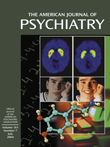Sleep Disturbance and Risk for Alcohol-Related Problems
Abstract
OBJECTIVE: Using prospective data, the authors assessed the risk of alcohol-related problems among individuals with self-reported sleep disturbances because of worry. METHOD: As part of the Epidemiologic Catchment Area program, a probability sample of Baltimore residents selected by census tracts and households completed a baseline interview in 1981. Between 1993 and 1996, the original Baltimore cohort was traced. Of the 2,633 survivors, a total of 73% were reinterviewed. After excluding individuals with alcohol-related problems or a current or prior history of alcohol abuse and/or dependence at the time of the 1981 interview, the authors identified a cohort of 1,537 individuals who were at risk for problem drinking at the time of the follow-up interview, a median of 12.6 years after the baseline interview. Logistic regression was used to assess the association between sleep disturbance because of worry and the risk for incident reports of alcohol problems. RESULTS: Survey respondents with sleep disturbances because of worry at the time of the baseline interview had a twofold higher risk for developing an alcohol-related problem, relative to those without these sleep disturbances (odds ratio=2.32, 95% confidence interval [CI]=1.31–4.09), with adjustment for selected demographic and clinical variables. Sleep disturbance because of worry predicted the development of alcohol problems among respondents with lifetime anxiety disorders and lifetime dysphoria (odds ratio=3.82, 95% CI=1.56–9.38, and odds ratio=2.71, 95% CI=1.25–5.91, respectively), but not among those without a history of anxiety disorders or dysphoria. CONCLUSIONS: Sleep disturbances because of worry may increase risk for alcohol-related problems. Risk is highest for those with sleep disturbance and co-occurring anxiety disorders or dysphoria.



